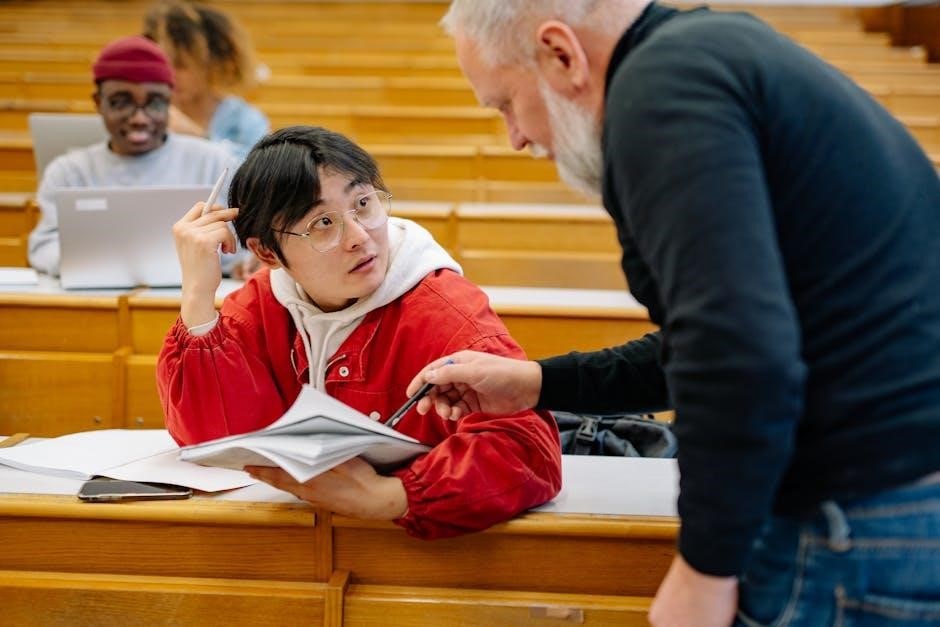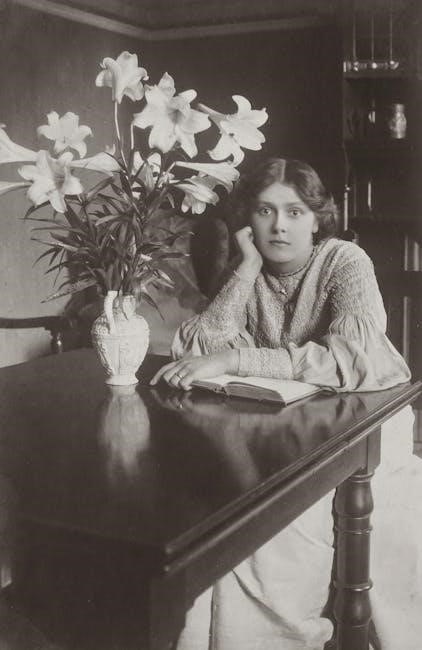
Flowers for Algernon is a thought-provoking science fiction novel by Daniel Keyes, exploring themes of identity, human condition, and ethical science through Charlie Gordon’s transformative journey. The story delves into intellectual and emotional growth, raising questions about societal treatment of the mentally disabled and the consequences of scientific experimentation. This powerful narrative challenges readers to reflect on humanity, morality, and the true meaning of intelligence.

Plot Summary of Flowers for Algernon
Flowers for Algernon follows Charlie Gordon, a man with an intellectual disability who undergoes an experimental surgical procedure to enhance his intelligence. Charlie, working as a janitor, is selected for the trial after showing potential in preliminary tests. The procedure, which involves a mouse named Algernon who has already undergone the experiment, promises unprecedented cognitive improvement. Initially, Charlie’s intelligence and awareness soar, allowing him to grasp complex concepts and form deeper connections with others. However, as time progresses, Charlie discovers that the effects are temporary. Algernon’s sudden decline and death foreshadow Charlie’s own fate, leading to a heart-wrenching realization of his impending regression. The novel explores Charlie’s emotional and intellectual journey, highlighting themes of identity, humanity, and the ethical implications of scientific experimentation.

Themes in Flowers for Algernon
Flowers for Algernon explores themes of mental disability, intellect vs. emotion, and the ethics of scientific experimentation, reflecting society’s treatment of the mentally impaired through Charlie’s journey and emotional growth.
3.1 Mistreatment of the Mentally Disabled
The novel highlights the mistreatment of the mentally disabled through Charlie Gordon’s experiences. Society often marginalizes and misunderstands individuals with intellectual disabilities, as seen in Charlie’s workplace and personal interactions. His coworkers mock him, and even those close to him fail to recognize his humanity. The novel critiques how mentally disabled individuals are frequently treated as outcasts rather than beings deserving of respect and compassion. Charlie’s desire to be “smart” stems partly from his hope to gain acceptance and end the loneliness caused by societal rejection. Through Charlie’s journey, Keyes sheds light on the emotional and psychological toll of such mistreatment, emphasizing the need for empathy and understanding.
3.2 Intellect vs. Emotion
The novel explores the tension between intellect and emotion through Charlie Gordon’s transformation. Initially, Charlie’s emotional simplicity contrasts with his low intelligence, but after the procedure, his intellect surpasses his emotional understanding. This imbalance leads to inner conflict, as Charlie struggles to reconcile his newfound intelligence with his deeply rooted emotional needs. The story highlights how intellect alone cannot fulfill human connection or emotional well-being. Charlie’s inability to process his past traumas intellectually exacerbates his emotional pain, underscoring the importance of emotional intelligence. The novel suggests that true humanity lies in the balance between intellect and emotion, rather than prioritizing one over the other. This theme challenges readers to reflect on the value of emotional depth in a world often dominated by rationality.
3.3 Persistence of the Past
The novel underscores the enduring influence of the past on human lives, particularly through Charlie Gordon’s experiences. Despite his intellectual advancements, Charlie’s memories of childhood trauma and family rejection persist, shaping his emotional struggles. His relationship with his mother, Rose, and sister, Norma, haunts him, illustrating how past wounds continue to affect his present. The story shows that even with enhanced intelligence, the emotional scars of the past remain, influencing decisions and self-perception. Charlie’s journey highlights the inescapability of personal history, emphasizing that true growth requires confronting, rather than escaping, one’s past. This theme resonates deeply, reminding readers that the past is an integral part of who we are, and its persistence shapes our future.
3.4 Ethical Implications
The novel raises significant ethical concerns about scientific experimentation and its impact on human subjects. Charlie Gordon’s surgical procedure, intended to boost his intelligence, highlights the moral dilemmas of tampering with human cognition. The story questions the ethics of prioritizing scientific progress over human well-being, as Charlie’s consent is based on limited understanding. The researchers’ pursuit of knowledge often overshadows the risks and consequences for Charlie, underscoring the dangers of unchecked ambition. Additionally, the novel critiques the exploitation of vulnerable individuals for scientific gain, emphasizing the need for accountability in medical and psychological research. The ethical implications of Charlie’s journey serve as a cautionary tale, urging readers to reflect on the boundaries of science and the importance of prioritizing humanity and compassion.

Character Analysis
Charlie Gordon undergoes a dramatic transformation, revealing the complexity of human identity. His journey from innocence to self-awareness highlights the fragility of intelligence and emotion. Algernon, the lab rat, symbolizes the consequences of scientific hubris, while Dr. Strauss and Dr. Nemur embody the ethical dilemmas of experimentation. These characters collectively explore the human condition, ethics, and the true meaning of intelligence.
4.1 Charlie Gordon
Charlie Gordon, the protagonist of Flowers for Algernon, is a man with an intellectual disability who undergoes an experimental surgery to enhance his intelligence. His journey is deeply emotional, as he transitions from a state of innocence and simplicity to one of heightened awareness and self-discovery. Initially, Charlie is eager to learn and please others, driven by a desire to be “smart.” As his intelligence grows, so does his understanding of the world and his place in it. However, his newfound intellect also brings him pain, as he grapples with the realization of his own mortality and the impermanence of his transformation. Charlie’s story is a poignant exploration of identity, humanity, and the ethical implications of scientific intervention.
4.2 Algernon
Algernon, a genetically engineered laboratory rat, plays a pivotal role in Flowers for Algernon as the first successful subject of the intelligence-enhancing experiment. His remarkable abilities showcase the potential of the procedure, which is later applied to Charlie Gordon. Algernon’s journey mirrors Charlie’s, as both experience a rapid increase in intelligence followed by a tragic decline; The rat’s character serves as a symbol of scientific experimentation and its ethical implications. Through Algernon’s progression and eventual deterioration, the novel highlights the transient nature of the experiment and the consequences of tampering with nature. Algernon’s story not only foreshadows Charlie’s fate but also underscores the emotional and moral complexities of the narrative, making him an integral and memorable element of the story.
4.3 Dr. Strauss
Dr. Strauss is a psychiatrist and one of the key figures in the intelligence-enhancing experiment that Charlie undergoes. He works closely with Dr. Nemur to develop the procedure, showcasing his expertise in cognitive development and psychological assessment. Unlike Dr. Nemur, Dr. Strauss exhibits a more empathetic approach, often displaying concern for Charlie’s well-being and the ethical implications of their work. His character represents the moral ambiguity of scientific experimentation, as he struggles with the consequences of altering human intelligence. Dr. Strauss’s interactions with Charlie reveal his genuine interest in the young man’s progress, though his professional detachment sometimes limits his emotional connection. Ultimately, his role in the novel highlights the tension between scientific ambition and human compassion, making him a complex and significant figure in the story.
4.4 Dr. Nemur
Dr. Nemur is a prominent scientist in the intelligence-enhancing experiment alongside Dr. Strauss. His primary focus is on the scientific success of the procedure, often prioritizing the experiment’s goals over the ethical considerations. Dr. Nemur is depicted as a demanding figure with high expectations, pushing Charlie Gordon to achieve the best possible results. While his dedication to science is evident, his character also reveals a certain detachment from the human aspects of the experiment, which contrasts with Dr. Strauss’s more empathetic approach. This contrast adds depth to the narrative, highlighting the tension between scientific ambition and human empathy.

Symbolism and Motifs
The novel Flowers for Algernon employs several symbolic elements to convey its themes. Algernon, the lab mouse, symbolizes the experimental nature of Charlie’s procedure and serves as a constant reminder of the fragile outcomes of scientific intervention. The flowers in the title represent Charlie’s longing for beauty and human connection, reflecting his emotional journey. The laboratory setting itself acts as a motif, symbolizing the cold, detached environment of scientific experimentation, which contrasts with Charlie’s growing self-awareness. These symbols collectively highlight the tension between scientific progress and human vulnerability, emphasizing the ethical dilemmas at the heart of the story.

Guided Reading Questions and Answers
Engage with Flowers for Algernon through targeted questions, exploring themes, characters, and plot. Comprehension questions clarify events, while critical thinking prompts delve into ethical dilemmas and emotional depth, fostering deeper analysis and reflection on the novel’s complexities.
6.1 Comprehension Questions
What is Charlie Gordon’s initial condition, and how does it affect his life?
What motivates Charlie to undergo the experimental surgery?
Describe the purpose of the experiment and its expected outcomes.
How does Charlie’s relationship with Algernon reflect the themes of the novel?
What significant event occurs when Algernon’s condition begins to deteriorate?
How does Charlie’s perception of his past change as his intelligence increases?
What role do Dr. Strauss and Dr. Nemur play in Charlie’s transformation?
How does Charlie feel about his family and their treatment of him?
What realization does Charlie come to regarding the temporary nature of his intelligence?
Why do the scientists refuse to test the procedure on themselves?
These questions help readers grasp the plot, characters, and central conflicts in Flowers for Algernon, ensuring a deeper understanding of the story’s emotional and ethical layers.
6.2 Critical Thinking Questions
How does Charlie’s transformation challenge traditional notions of intelligence and humanity?
What ethical responsibilities do Dr. Strauss and Dr. Nemur bear for their experiment on Charlie?
In what ways does the novel critique societal attitudes toward the mentally disabled?
How does Charlie’s emotional journey compare to his intellectual growth?
What message do you think Keyes is conveying through Algernon’s fate?
Should scientific advancements always prioritize human benefits, or are there moral limits?
How does Charlie’s relationship with his family evolve, and what does this reveal about his inner struggles?
What does the novel suggest about the long-term consequences of playing with nature?
How does Charlie’s story relate to broader themes of identity and self-acceptance?
What lessons can readers draw from Charlie’s experiences about the importance of empathy?
These questions encourage readers to analyze the novel’s deeper themes and reflect on its universal relevance to human experiences and ethical dilemmas.
Study Guide and Resources
Explore online resources, discussion forums, and guided reading materials to deepen your understanding of Flowers for Algernon. Utilize study guides for character analysis, themes, and plot summaries.
7.1 Online Resources
Enhance your understanding of Flowers for Algernon with online resources offering summaries, character analyses, and guided reading questions. Educational websites like SparkNotes and LitCharts provide detailed plot breakdowns, while forums and discussion groups share student insights. YouTube tutorials and webinars offer video explanations of key themes and motifs. Additionally, online databases such as JSTOR and Google Scholar host academic articles analyzing the novel’s ethical implications and literary significance. Utilize these tools to explore Charlie Gordon’s journey, the ethics of scientific experimentation, and the novel’s cultural impact. Many resources include quizzes and study guides to test comprehension and prepare for exams. These online materials are invaluable for both independent study and classroom discussions, offering a wealth of perspectives and study aids.
7.2 Discussion Forums
Engage with online discussion forums to explore Flowers for Algernon through shared perspectives and collaborative learning. Platforms like Reddit, Goodreads, and specialized literature forums host vibrant conversations about the novel. Students and readers exchange insights, discusses themes, and share interpretations of Charlie Gordon’s journey. These forums often include guided reading questions, encouraging deeper analysis of the text. Educators also use these spaces to assign discussions, fostering critical thinking and reflection. Participants can ask questions, clarify doubts, and gain new understandings of the novel’s complexities. Additionally, forums provide access to user-generated summaries, character analyses, and study tips. By participating in these online communities, readers can enrich their comprehension of Flowers for Algernon and connect with others who share a passion for the story. These discussions often highlight the novel’s relevance to contemporary issues in ethics and human rights.

Author Background: Daniel Keyes
Daniel Keyes, born on August 27, 1927, in Brooklyn, New York, was an American author renowned for his thought-provoking science fiction and literary works. Before becoming a writer, Keyes studied psychology and worked in various fields, including journalism and academia. His experiences deeply influenced his writing, particularly in exploring themes of human identity and ethical dilemmas. Keyes gained widespread acclaim with his novel Flowers for Algernon, which won the Hugo Award for Best Short Story in 1959 and was later expanded into a full novel. His work often delves into the complexities of human emotions, intellectual growth, and societal issues, making him a significant figure in 20th-century literature. Keyes’ ability to weave compelling narratives with profound moral questions has left a lasting impact on readers and writers alike.

Literary Impact and Legacy
Flowers for Algernon has profoundly impacted literature, exploring identity, ethics, and humanity. Its emotional depth and scientific themes resonate widely, making it a staple in educational curricula and popular culture.
9.1 Cultural Impact
Flowers for Algernon has left an indelible mark on culture by sparking conversations about identity, humanity, and ethics. Its exploration of Charlie Gordon’s journey resonates deeply, challenging societal norms and fostering empathy. The novel’s emotional depth and scientific themes have made it a cultural touchstone, often referenced in media and academia. By addressing issues like mental disability and experimentation, it has inspired discussions on human rights and intellectual freedom. Its influence extends to education, where it is widely taught to encourage critical thinking and emotional intelligence. The book’s ability to bridge science fiction and heartfelt storytelling has solidified its place in cultural history, continuing to captivate audiences and inspire new adaptations and interpretations.
9.2 Educational Use
Flowers for Algernon is widely used in educational settings to explore complex themes and foster critical thinking. Teachers often incorporate the novel into curriculum designs, using its narrative to discuss ethics, identity, and human rights. The story’s emotional depth and scientific elements make it a valuable tool for teaching empathy and encouraging students to reflect on societal issues. Many schools use guided reading questions to help students analyze Charlie Gordon’s journey, promoting deeper understanding of the text. Online discussion forums and study guides further enhance learning, allowing students to engage with the material collaboratively. The novel’s accessibility and relevance make it a popular choice for English literature courses, helping students develop analytical and emotional intelligence while meeting educational standards.
9.3 Popularity Over Time
Flowers for Algernon has maintained its popularity since its publication in 1959, resonating with readers across generations. Its unique narrative style and emotional depth have contributed to its enduring appeal. The novel has won multiple awards, including the Hugo Award, which further cemented its place in literary history. Over the years, it has been adapted into films, plays, and other media, introducing the story to new audiences. The themes of identity, ethics, and human potential continue to captivate readers, making it a timeless classic. Its inclusion in school curricula has also ensured its relevance, as students engage with its thought-provoking content. The book’s ability to balance intellectual and emotional elements has solidified its status as a beloved and thought-provoking read, remaining widely popular and influential in modern times.

Ethical Considerations in the Novel
Flowers for Algernon raises profound ethical questions about scientific experimentation and its impact on human life. Charlie Gordon’s transformation through the procedure challenges the morality of altering human intelligence, highlighting issues of informed consent and the exploitation of vulnerable individuals. The novel critiques the lengths to which scientists may go in pursuit of knowledge, often disregarding the emotional and psychological consequences for their subjects. It also sparks debates about the value of human life, the ethics of tampering with nature, and the responsibility that comes with scientific advancements. The story serves as a cautionary tale, urging readers to reflect on the ethical boundaries of medical and scientific interventions and their effects on individuals and society.

Reflection and Discussion Topics
Reflecting on Flowers for Algernon, readers can explore themes like the ethics of scientific experimentation, the tension between intellect and emotion, and societal attitudes toward disability. Discussion topics might include:
- How does Charlie’s journey challenge perceptions of intelligence and humanity?
- What ethical dilemmas arise from the scientists’ pursuit of knowledge?
- How does the novel portray the consequences of playing god with human life?
- What message do you think Daniel Keyes conveys about the value of human connection?
- How does Algernon’s fate mirror Charlie’s, and what does this symbolize?
These topics encourage deeper analysis of the novel’s moral complexities and emotional depth, fostering meaningful conversations about its timeless themes.
Flowers for Algernon is a profound exploration of human identity, ethics, and the complexities of scientific progress. Through Charlie Gordon’s poignant journey, Daniel Keyes challenges readers to reflect on the consequences of tampering with nature and the importance of emotional connection. The novel critiques societal attitudes toward disability and raises essential questions about the morality of experimentation. Charlie’s transformation from a simple-minded janitor to a genius, and his eventual decline, underscores the fragility of human intelligence and the enduring power of empathy. This timeless story leaves a lasting impact, encouraging readers to value both intellect and emotion while questioning the ethical boundaries of scientific advancement. Keyes’ masterpiece remains a powerful reminder of humanity’s shared experiences and the importance of compassion in a world driven by progress.






